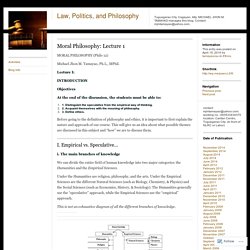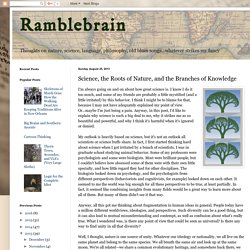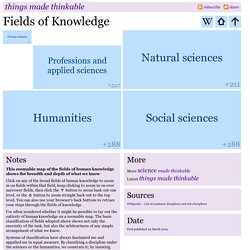

Law, Politics, and Philosophy. MORAL PHILOSOPHY (Philo 12) Michael Jhon M.

Tamayao, Ph.L., MPhil. Lecture I: Objectives At the end of the discussion, the students must be able to: 1. Before going to the definition of philosophy and ethics, it is important to first explain the nature and approach of our course. I. I. We can divide the entire field of human knowledge into two major categories: the Humanities and the Empirical Sciences. Under the Humanities are religion, philosophy, and the arts. This is not an exhaustive diagram of all the different branches of knowledge. Philosophy is a speculative science because it is under the broader speculative discipline of Humanities. Ii. The word “empirical” came from the Greek word “empirikos”, which means “experience.”
Iii. We usually associate the empirical way of thinking with inductive reasoning, and the speculative with deductive reasoning. Iv. What is ultimate reality? How can I know? How can I know correctly? Terminology - Does "Science" encompass Mathematics? - Academia Stack Exchange. Unfortunately the duplicate in mathematics hasn't got good answers, so I will give it a try.

The answer is: Mu. It means that the question must be unasked or that neither "yes" nor "no" is right or wrong. Mathematics is examining the properties of consistent mental models or structures. It started with numbers and geometric figures and it was used for applications (counting, area calculation) from the beginning. It would not be completely wrong to name it "number philosophy" although it has expanded greatly and examines now a innumer...a very great number of concepts. An example to show the difference to science: Let's say a scientist would try to prove the Pythagorean theoreom without mathematics.
A mathematician can prove that the sides are exactly equal. Mathematics is a necessary part of science because it is a building block for any precise models we need to refine the work. So mathematics is "sciency". So mathematics is not a science. Ramblebrain: Science, the Roots of Nature, and the Branches of Knowledge. I'm always going on and on about how great science is.

I know I do it too much, and some of my friends are probably a little mystified (and a little irritated) by this behavior. I think I might be to blame for that, because I may not have adequately explained my point of view. Or...maybe I'm just being a pain. Anyway, in this post, I'd like to explain why science is such a big deal to me, why it strikes me as so beautiful and powerful, and why I think it's harmful when it's ignored or denied. My outlook is heavily based on science, but it's not an outlook all scientists or science buffs share. Anyway, all this got me thinking about fragmentation in human ideas in general. Philosophy. Historically, "philosophy" encompassed any body of knowledge.[14] From the time of Ancient Greek philosopher Aristotle to the 19th century, "natural philosophy" encompassed astronomy, medicine and physics.

For example, Newton's 1687 Mathematical Principles of Natural Philosophy later became classified as a book of physics. In the 19th century, the growth of modern research universities led academic philosophy and other disciplines to professionalize and specialize.[16][17] In the modern era, some investigations that were traditionally part of philosophy became separate academic disciplines, including psychology, sociology, linguistics and economics. Other investigations closely related to art, science, politics, or other pursuits remained part of philosophy. For example, is beauty objective or subjective?
[18][19] Are there many scientific methods or just one? Since the 20th century professional philosophers contribute to society primarily as professors, researchers and writers. Culture. Fields of Knowledge. This zoomable map of the fields of human knowledge shows the breadth and depth of what we know Click on any of the broad fields of human knowledge to zoom in on fields within that field, keep clicking to zoom in on ever narrower fields, then click the button to zoom back out one level, or the button to zoom straight back out to the top level.

You can also use your browser's back buttons to retrace your steps through the fields of knowledge. I've often wondered whether it might be possible to lay out the entirety of human knowledge on a zoomable map. Systems of classification have always fascinated me and appalled me in equal measure. This particular classification is based on Wikipedia's List of academic disciplines and sub-disciplines. Button to show the Wikipedia article for the field shown). Outline of academic disciplines. Overviews of and topical guides to academic disciplines Collage of images representing different academic disciplines Disciplines vary between well-established ones that exist in almost all universities and have well-defined rosters of journals and conferences, and nascent ones supported by only a few universities and publications.

A discipline may have branches, and these are often called sub-disciplines. Humanities[edit] Performing arts[edit] Visual arts[edit] History[edit] Branches of science. The scale of the universe mapped to the branches of science and the hierarchy of science The branches of science (also referred to as "sciences", "scientific fields", or "scientific disciplines") are commonly divided into three major groups: natural sciences, which study natural phenomena (including fundamental forces and biological life), formal sciences (such as mathematics and logic, which use an a priori, as opposed to factual, methodology) and social sciences, which study human behavior and societies.[1] The natural sciences and social sciences are empirical sciences, meaning that the knowledge must be based on observable phenomena and must be capable of being verified by other researchers working under the same conditions.

These three categories make up the fundamental sciences, which form the basis of interdisciplinary and applied sciences such as engineering and medicine. Natural science[edit] Types of Knowledge. Understanding the different forms that knowledge can exist in, and thereby being able to distinguish between various types of knowledge, is an essential step for knowledge management (KM).

For example, it should be fairly evident that the knowledge captured in a document would need to be managed (i.e. stored, retrieved, shared, changed, etc.) in a totally different way than that gathered over the years by an expert craftsman. Over the centuries many attempts have been made to classify knowledge, and different fields have focused on different dimensions. This has resulted in numerous classifications and distinctions based in philosophy and even religion. Though not directly related to our purpose here, the wikipedia article on knowledge provides some interesting background reading (go to article).